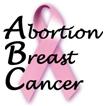New England Journal of Medicine Recognizes Abortion - Breast Cancer Link
An international women's group called the Coalition on Abortion/Breast Cancer reports that the New England Journal of Medicine, which three years ago published the Melbye study denying the abortion-breast cancer link, has quietly acknowledged that induced abortion is a risk factor for breast cancer.
It has been forty-three years since the first study on the abortion-breast cancer link was published in 1957. This was a study published in an English language publication, GANN, and it reported a 160% elevated risk of breast cancer among Japanese women following induced abortion. 1. Subsequently, the World Health Organization published its study in 1970 and said that the results "suggested increased risk associated with abortion -- contrary to the reduction in risk associated with full-term births." 2. In 1980 Russo and Russo published the results of their study involving laboratory rats which confirmed a relationship between abortion and increased risk of breast cancer. 3.
Three years ago the world's most influential medical journal, the New England Journal of Medicine (NEJM), published a Danish study which denied the abortion-breast cancer link. Known as the Melbye study, these researchers concluded that "Induced abortions have no overall effect on the risk of breast cancer." 4. Also published in the NEJM was an editorial by a National Cancer Institute epidemiologist which asserted that "a woman need not worry about the risk of breast cancer" when she contemplates an abortion. 5.
On March 13, 2000 the Royal College of Obstetricians and Gynecologists became the world's first medical organization to warn its abortion providers that the abortion-breast cancer link "cannot be disregarded" and that a 1996 review of the worldwide studies done by Dr. Joel Brind, President of the Breast Cancer Prevention Institute, was "carefully conducted" and "had no major methodological shortcomings." 6.
Mrs. Karen Malec, President of the coalition, said "Now that 27 out of 33 worldwide studies have reported a link between abortion and breast cancer (13 out of 14 of which are American studies reporting a link) and 43 years since the first study, the New England Journal of Medicine has finally chosen to recognize the overwhelming evidence of an abortion-breast cancer link."
In the text of an article entitled, "Assessing the Risk of Breast Cancer," by Katrina Armstrong and her associates from the University of Pennsylvania School of Medicine the following statement was made: "Other risk factors have been less consistently associated with breast cancer (such as diet, use of oral contraceptives, lactation, and abortion)." 7.
Said Mrs. Malec, "While the overwhelming weight of the evidence associating abortion with breast cancer would seem to require a more complete and emphatic statement of the facts, this statement, according to Dr. Brind, 'represents a sea change from a position of full-blown denial in American organized medicine.'" 8.
- 1. Segi et al. (1957) GANN 48 (Suppl):1-63
- 2. MacMahon B, et al. Bull Wld Health Org (1970); 43-209-21
- 3. Russo & Russo (1980) Am J. Pathol 100:497-512
- 4. Melbye et al. (1997) NEJM 336:81-5
- 5. Hartge (1997) NEJM 336:127-8
- 6. "Evidence-based Guideline No. 7: The Care of Women Requesting Induced Abortion," Royal College of Obstetricians and Gynecologists, Press Conference, March 13, 2000
- 7. Armstrong (2000) NEJM 342:564-71
- 8. Joel Brind, Ph.D., "Abortion Now a "Risk Factor" According to Latest New England Journal Review, Abortion Breast Cancer Quarterly Update, Spring 2000, Vol. 4, No. 1

